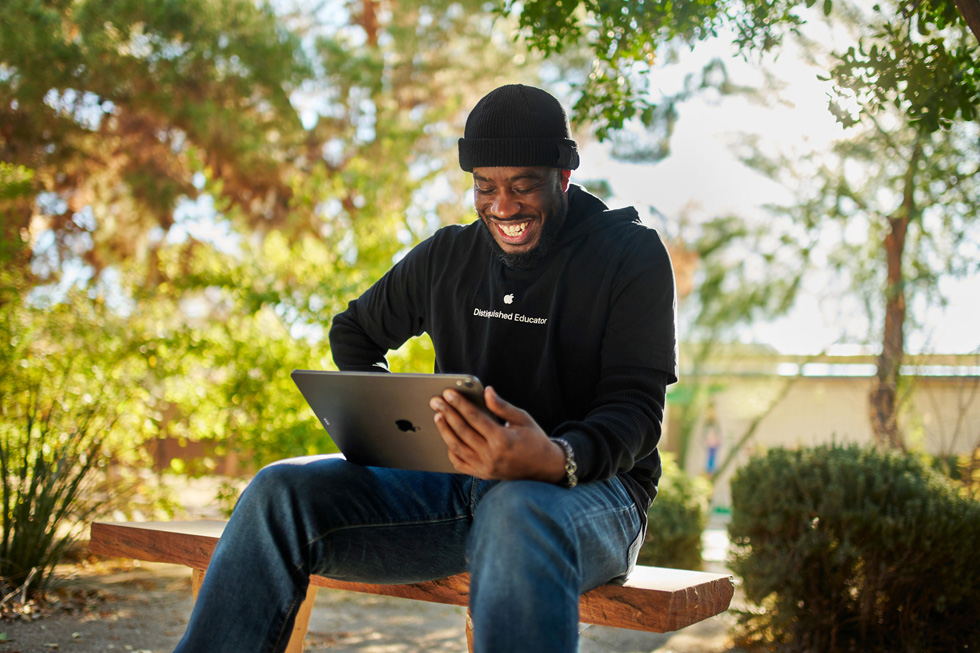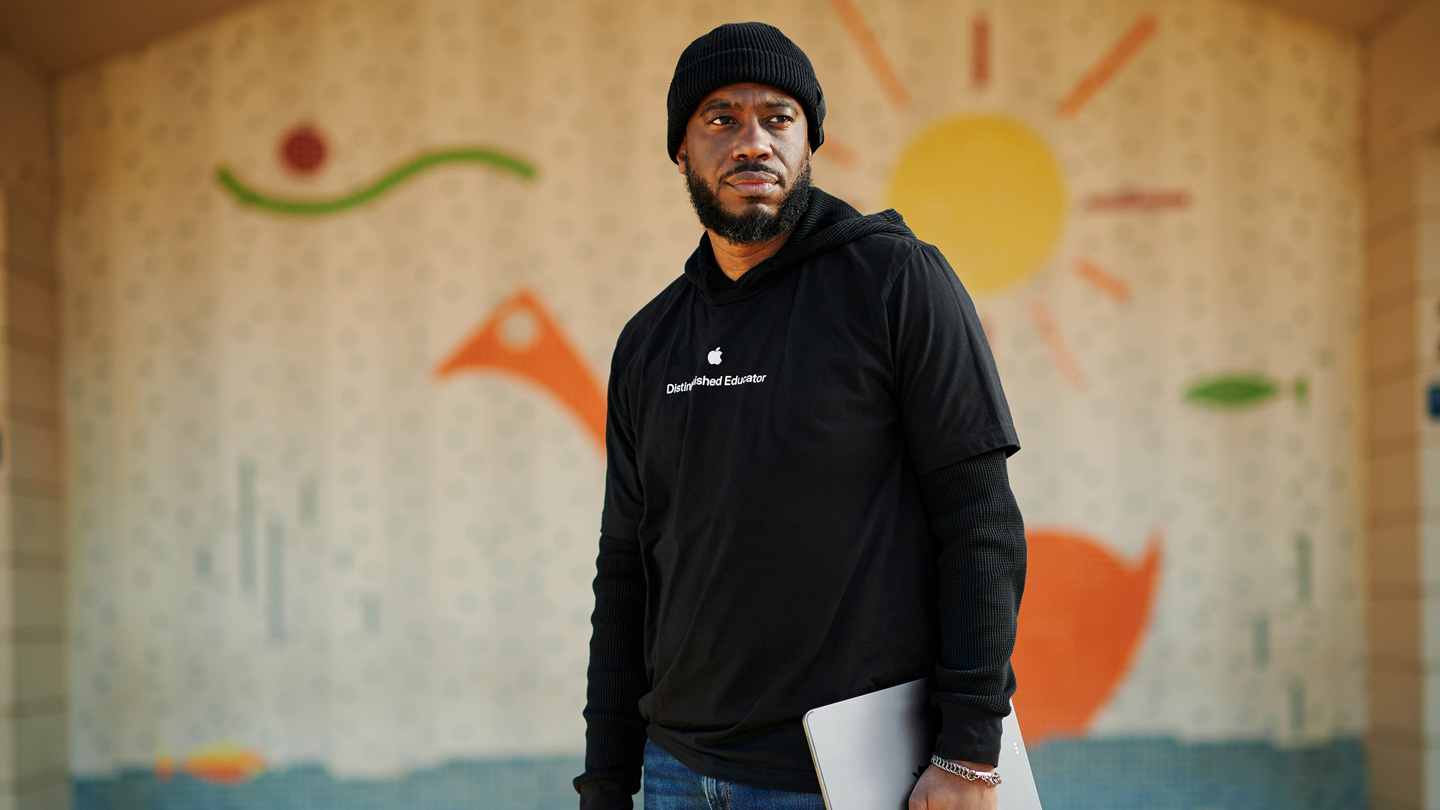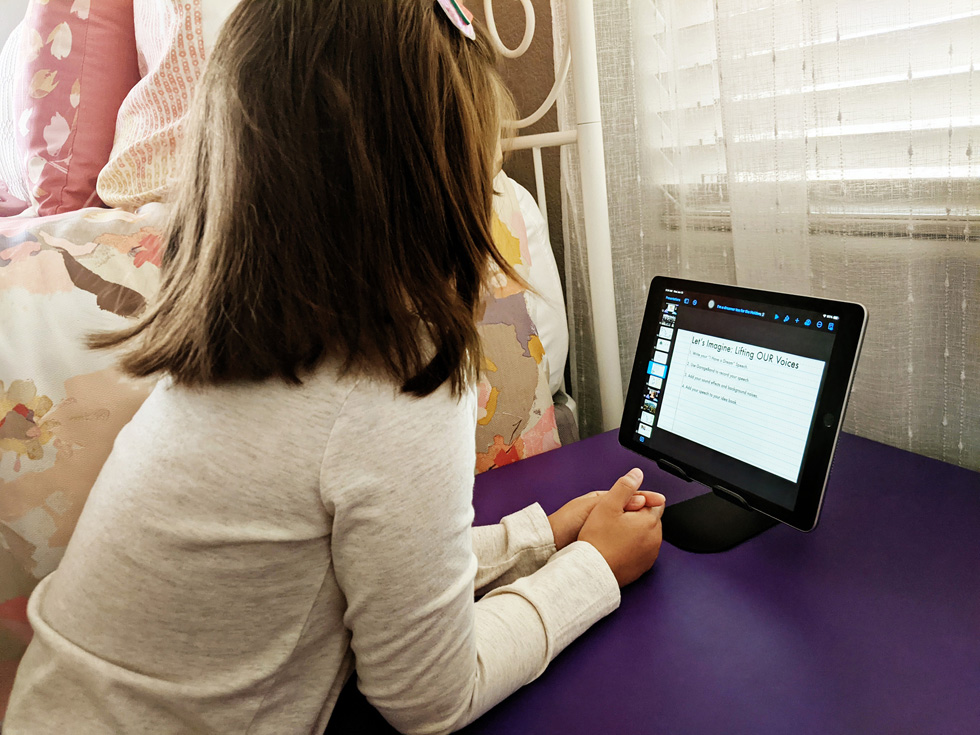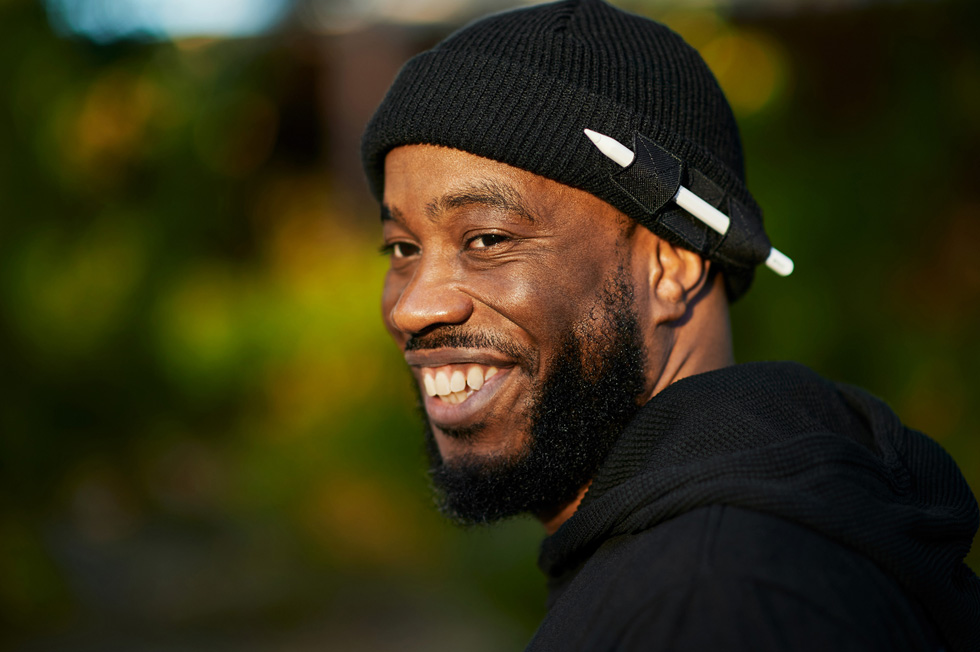FEATURE
January 18, 2021
Apple Distinguished Educator Mike Lang draws blueprint for change in Las Vegas
Neon signs are not the only things shining bright in Las Vegas. Mike Lang, technology instructor at Clark County School District’s Laura Dearing Elementary School on the East Side of Las Vegas, is putting the spotlight on his students as civic servants and activists in their local community.
“My hope for all my students is that they see and consider themselves as citizens of the world who are responsible for helping others be successful,” Lang says. This month, Lang initiated a three-part project with his kindergarten and first grade students to honour Dr. Martin Luther King Jr.’s legacy and instil a sense of civic duty in them. “That’s the ultimate goal: We want people who are going to be informed, passionate, patriotic in the true sense of that word, and who are going to be empathetic.”
The first part of Lang’s project is designed to show kids that they are valuable, using children’s book author Christian Robinson’s “You Matter” as a starting point for self-reflection. “Kids have to have a level of self-esteem to believe that their point of view matters, their story matters, their opinions matter, and their ideas matter,” he says. “It’s important for students to understand they have inherent power just because they are themselves.”
Students will use iPad to capture and edit images of themselves, their family, and their neighbourhoods, and then craft their stories about why they matter using the PBS KIDS ScratchJr coding app on iPad. Next, the students will research Dr. King’s life and legacy using Brad Meltzer’s book “I Am Martin Luther King Jr.,” and compare and contrast themselves to him by creating double exposure portraits of themselves with the civil rights leader. Finally, in the “I’m a Dreamer, Too” segment of the project, Lang will ask them how they can be of service to each other and their neighbours. The students will complete interactive workbooks in Keynote for each part of the project, and he will compile their thoughts into a collated book of their ideas, which they will have the opportunity to share with community organisers and legislators in Las Vegas later this semester.

Incorporating interactive workbooks in Keynote on iPad, Apple Distinguished Educator Mike Lang’s three-part learning project is designed to show students they matter, help them examine Dr. Martin Luther King Jr.’s life, and encourage them to be the change they want to see in their Las Vegas community.
Lang has been teaching in the Clark County School District for 14 years. Prior to arriving in Las Vegas, the Washington, D.C.-native taught fourth graders in Pascagoula, Mississippi, before traveling overseas to teach English in the small town of Miaoli City in Taiwan. It was there that he discovered how technology could be used as a tool for learning. And it all started with an iPod. “I was trying to figure out a way to teach English to kids that spoke Mandarin in a way that would be engaging,” Lang says.
After purchasing an iPod in Taiwan in 2004, Lang leaned on American music — from classic rock to hip hop — to immerse his students in the English language. And when he arrived in Las Vegas three years later, he set out to acquire as many iPod shuffles and nanos he could get his hands on, using the audio editing software Audacity on Mac to record his lessons and distribute them to his students.
“I saw how technology could transform and transfer information to students far more efficiently than me trying to explain it,” Lang says. “I became a digital learning coach after that and started to spread the gospel of having kids make things with devices. I’ve been blessed to grow with the evolution of digital in classrooms.”
Today Lang sees himself — and all teachers, really — as architects. Paying tribute to American architect Louis Sullivan and his book “Kindergarten Chats,” in which Sullivan established the phrase “form follows function,” Lang believes every lesson plan requires the right form and function to be successful for all students. “You have to have the right blueprints for the right tasks,” Lang says. “It takes a lot of craftsmanship and looking at it from an architect’s point of view to say, how do you encourage the user to use your product and use it dynamically and use it in ways that perhaps you didn’t even intend it to be used?”
In a way, Lang’s overarching philosophy on teaching can be applied to the way his students see and shape themselves in the world. At the completion of the project, his students will have a blueprint of ideas for changing their community and the roles they can play in making that change happen.
With Lang’s project already underway, today also marks the launch of Apple’s second challenge in the “Taking Action on Racial Equity and Justice” learning series, “Make a Positive Impact in Your Community.” The “Challenge for Change” series includes a set of conversation guides based on the challenge-based learning framework and designed to help educators, community leaders, and individuals have thoughtful conversations on issues related to race and inequality. “We as educators have to enter the classroom every day with the idea that one, if not all, of our students could change the world,” Lang says. “It can be a Martin Luther King Jr., it can be a Bernice King, could be a Coretta Scott King, someone who would hopefully be a beacon to which other people rally.”
Announced this morning in a call to action from The King Center’s Dr. Bernice A. King, the second youngest daughter of Dr. King, this challenge encourages people to give back to their “beloved communities,” which Lang believes must start in schools.
“Martin Luther King Jr.’s legacy of striving to be excellent, striving to do what’s right, and striving to be fair goes beyond race. It’s economics and empathy, and this idea of solidarity with all human beings,” says Lang. “My hope is that my students come to the realisation that there is a basic humanity that we need to always be beholden to, not only within their class, not only within their school, but within their community, their city, their country, and the world.”
Share article
Images of Apple Distinguished Educator Mike Lang


